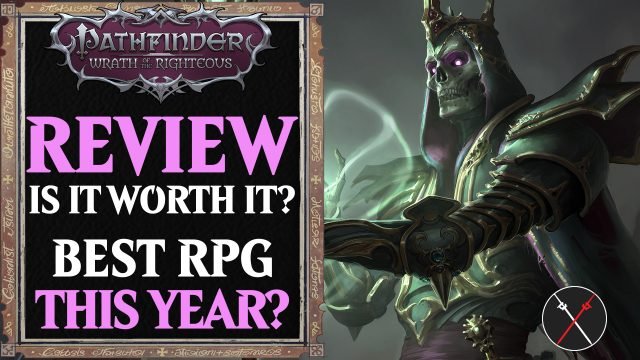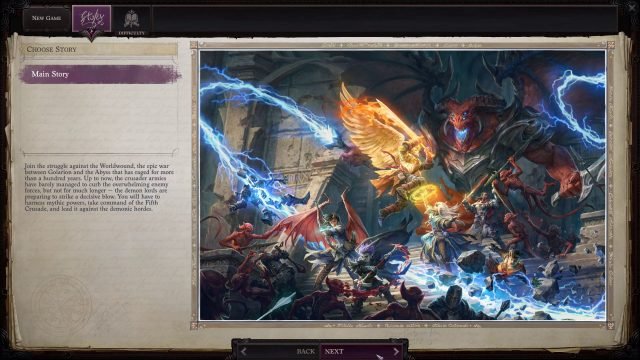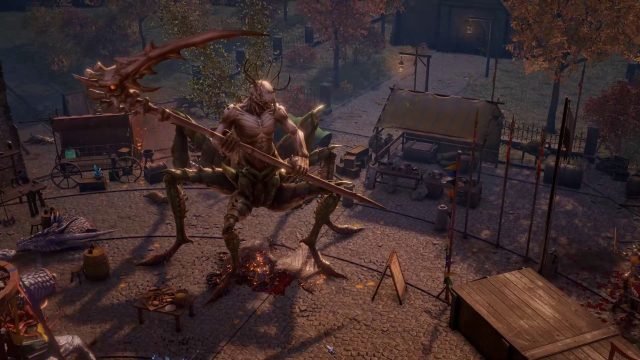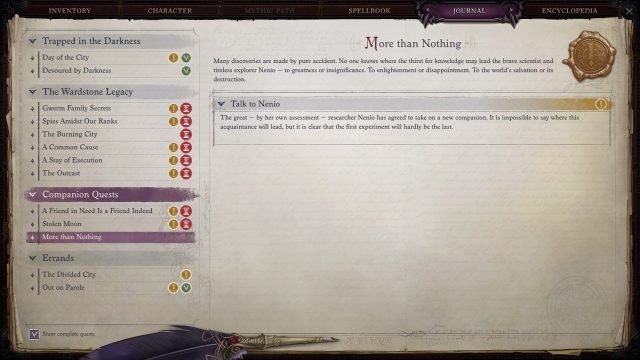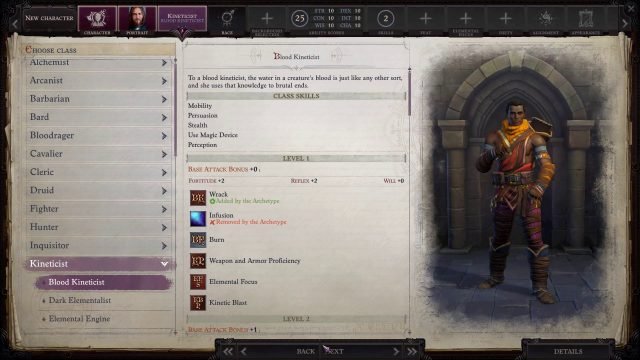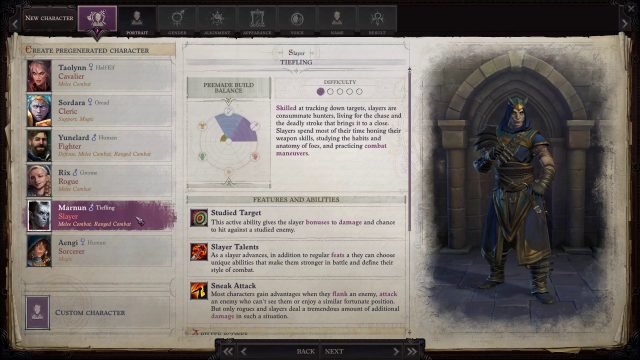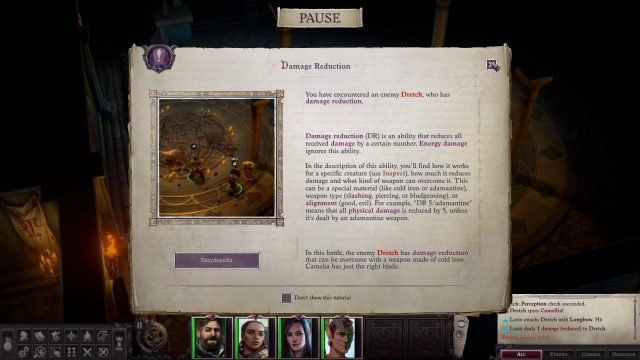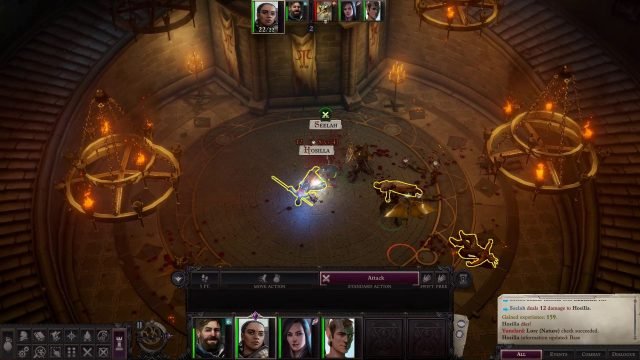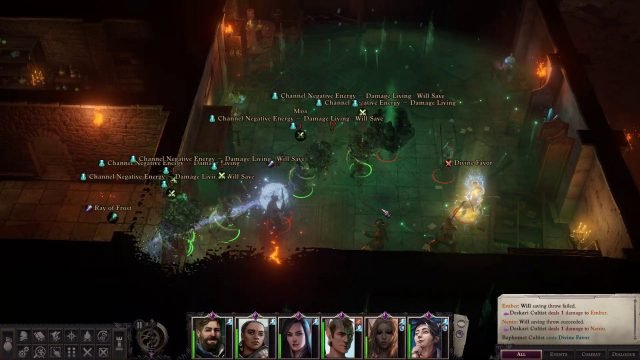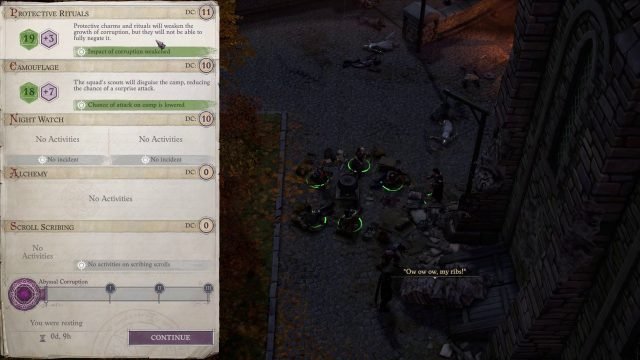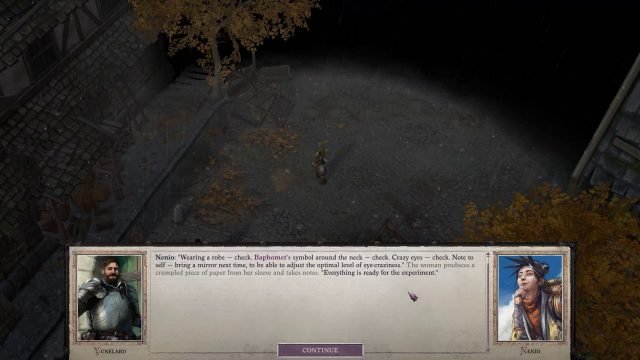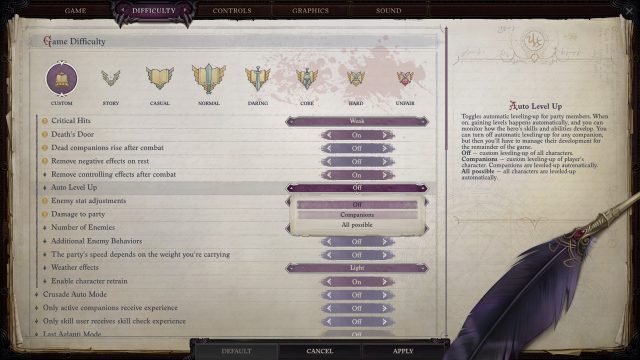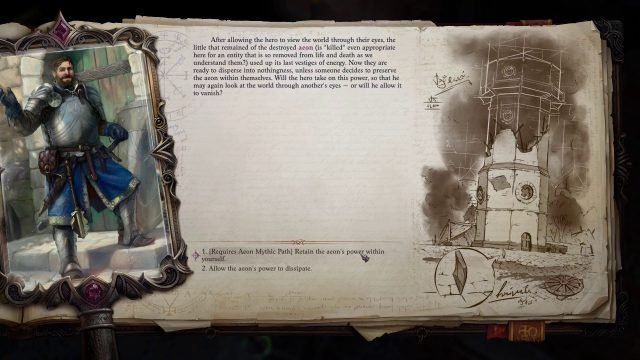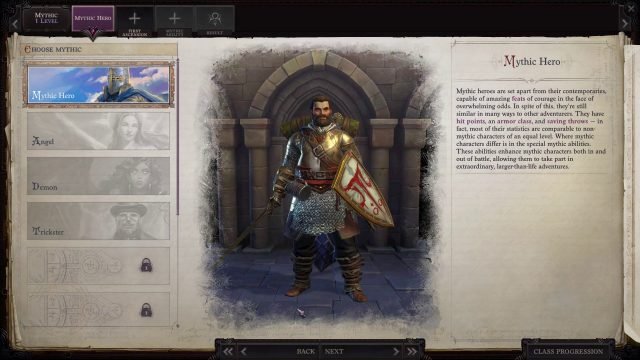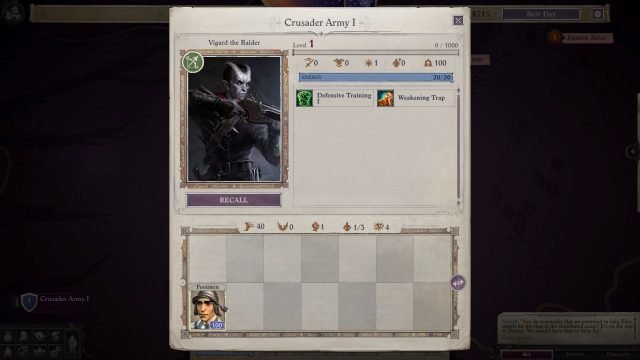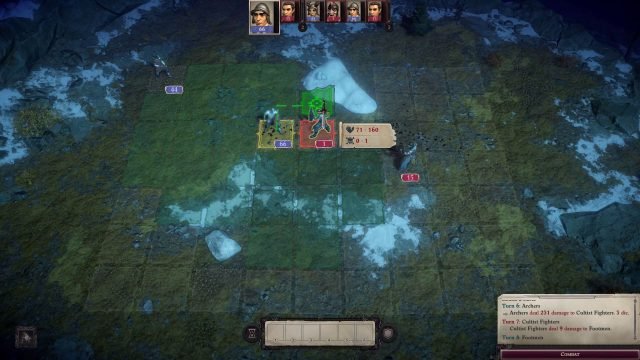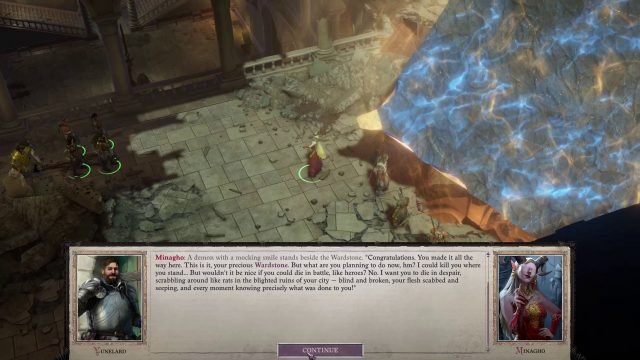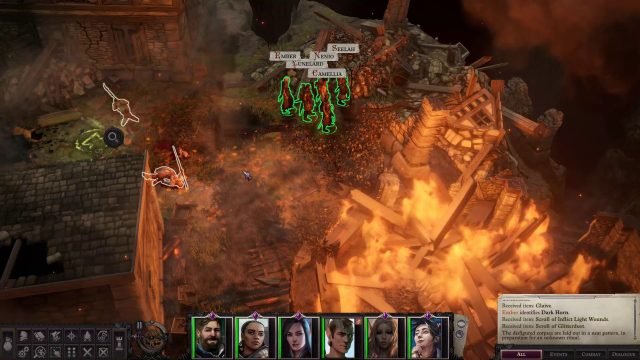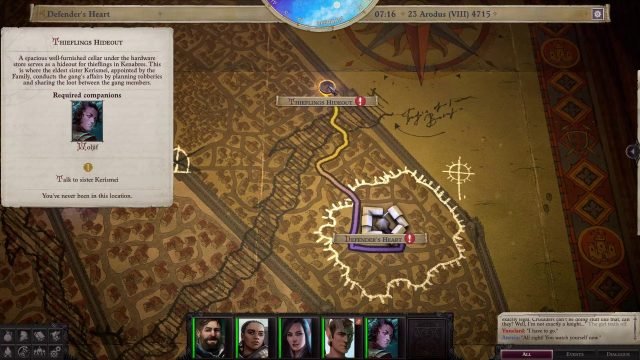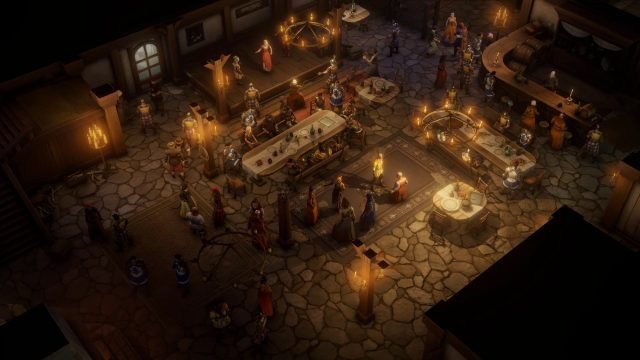In this Pathfinder: Wrath of the Righteous Review, we’re going to take a deep dive into the new isometric and fantasy CRPG, which is the sequel to Pathfinder: Kingmaker but with a different storyline altogether. The game is developed by Owlcat Games and published by META Publishing. It’s available on PC via Steam, GOG, Epic Games Store, and it’ll be released on the PlayStation 4 and Xbox One on March 1, 2024.
Pathfinder: Wrath of the Righteous draws inspiration from its tabletop version of the same name that utilizes the Pathfinder 1st Edition Ruleset. It also has new mechanics such as the Mythic Path System and Crusader Army Management. How does this sequel stack up compared to Kingmaker? Is Pathfinder: Wrath of the Righteous worth it? We’ll answer all of these questions and more in this Pathfinder Wrath of the Righteous Review!
Pathfinder Wrath of the Righteous Review | A Colossal CRPG
- Genre: Isometric and Fantasy CRPG
- Developed by: Owlcat Games
- Published by: META Publishing
- Release date: September 2nd, 2024
- Platforms: PC, PlayStation 4, Xbox One (Code Provided by Owlcat Games)
- Price at the time of review: 49.99 USD for the Core Edition
Pathfinder Wrath of the Righteous Review: Story and Setting
Pathfinder: Wrath of the Righteous is set in Golarion, specifically in the realm of Sarkoris, which received the brunt of the destruction caused by demons. Attempts to push them back amidst numerous crusades have all been in vain so much so that after 100 years, Sarkoris becomes a demon-infested wasteland now known as the Worldwound.
In the present time, another invasion led by the forces of Demon Lords Deskari and Baphomet has been initiated to annihilate anyone who opposes their ways. Your goal is to effectively rid the world of these demons with the help of your Companions and Mythic Powers while commanding the Fifth Crusade to fight for survival. But who can you trust? Can you and your newly formed armies resist the temptations of corruption? Will you be able to redeem yourself in the end, regardless of the things you have to do to get there?
These are just some of the many questions you’ll ask yourself as you play through each of the 6 sprawling chapters in Pathfinder: WotR. You’ll start your journey in Kenabres and from there, you’re going to visit other Locations in the hopes of reclaiming the lands the nation has lost.
Pathfinder: WotR is a gargantuan game with intricate and well-written storylines. Main Quests can either push you closer or farther away from defeating demonic hordes and their followers. Side quests, on the other hand, are as captivating as they can be because they let you learn much more about your Companions and what their motivations are in joining you on your crusade. You also have Mythic Quests based on your chosen Mythic Path together with Crusade Quests to enhance your armies.
There’s definitely no shortage of missions to complete and lands to explore in this huge world that’s ripe for the taking. Each location, say Kenabres and Drezen, differs from one another, making the experience unique. What adds to this is how epic the war and its stories unfold before you. Make no mistake, every choice matters and you’ll see the world adjust to these. Complicated things like determining who deserves to live and to die are choices you’ll have to stand by until the very end.
What makes these quests much more fun to do is how Pathfinder: WotR rewards you for completing them. Exploring every part of the map, engaging in Combat, and finishing side quests allow you to accumulate XP and good-quality loot in the process. Not only do you find out about the immersive storytelling, but you also gain the tools necessary to greatly improve your characters along the way. Regardless of whether or not you’re new to the Pathfinder Series or CRPGs, you won’t want to pass up on this game’s intricate and engaging plot points.
Pathfinder Wrath of the Righteous Review: Gameplay and Combat
Pathfinder: WotR is based on Pathfinder 1st Edition Ruleset created by Paizo, similar to its predecessor. Pathfinder, on the other hand, is a spin-off of Dungeons & Dragons 3.5th Edition and is also known as D&D’s revised edition. For the most part, the developers have created a faithful adaptation of the Pathfinder tabletop version although some features have been changed. This includes adding story twists and allowing you to make alignment changes based on the choices you make. For example, you can choose the Lich Mythic Path while still fighting against hordes of demons.
Character Creation
Pathfinder: WotR’s Character Creation is massive and much more customizable than in Kingmaker. There are 25 Classes with more than 5 Subclasses or Archetypes to choose from per Class, 13 Prestige Classes whose requirements have to be met first before you can access them, and 12 Races.
The time you spend in creating your first character can take up to several hours depending on the best Class, Race, Background, Ability Scores, Skills, Feats, Alignment, and Appearance you select. However, if you’re bogged down by the details of each Archetype, you can pick from any of the 6 pre-generated characters, which includes the Cavalier, Cleric, Fighter, Rogue, Slayer and Sorcerer Classes.
What makes choosing your Class and Race much more compelling is how NPCs integrate these facts into the dialogue. So when you’re conversing with them, they’ll notice these details, adding to the world’s reactivity to your choices. This is also true for the Mythic Path you pick when you reach Mythic Hero Level 3.
Given how intimidating and complex Character Creation is especially for new players, I’m hoping for the release of a Character Builder in one of the more recent updates of the game. It’s certainly cool to mix and match different Classes, Abilities and Feats as you experiment with multiclassing via this feature. It will also help you plan out your character’s progression every time they level up.
Combat and Difficulty
When it comes to combat, Pathfinder: WotR is more accessible compared to its predecessor. The tooltips have been integrated rather well into the game. As such, you’re able to understand the mechanics at your own pace rather than bombarding you with general tips at the start. Understanding the mechanics better is vital in successfully pulling off tactical combinations in order to outsmart your enemies. Multiclassing is also a staple of WotR although it’s best to stick with pure builds at the start if you aim to understand how Classes, Abilities and Feats effectively synergize with one another.
Game Modes and Dice Rolls
Another thing we want to discuss in this Pathfinder Wrath of the Righteous Review, is how relatively beginner-friendly the game is because you can now choose the game mode you want, may it be Turn-Based (TB) or Real-Time with Pause (RTwP). This wasn’t an option in the original release of Kingmaker, and Owlcat Games certainly listened to the community. If you’re new to Pathfinder or Dungeons & Dragons, then TB is the ideal game mode to start with since you’re able to slowly plan out the actions of your party per turn rather than going all in at the same time with RTwP.
For the most part though, you’re still going to be at the mercy of dice rolls and that’s acceptable. A common trait of these types of adaptations is to expect to reload multiple times to defeat enemies because of how terrible your luck may be in the first few tries. In spite of this, Pathfinder: WotR continues to be a fun, tactical game. Positioning, Feat and Ability planning, as well as selecting the best Spells and Powers are key to improving your chances of pulling off victories.
It certainly feels extremely rewarding going up against demonic forces in the hopes of pushing them to their limits. Reclaiming cities together with the joyful chants of its citizens inspires you to finish your crusades.
Rest
After fighting off hordes of demons and their followers, you’re going to have to take rests in order to replenish the party’s HP and Spells. This is also the avenue to brew potions and cook meals to buff everyone afterward. You can even scribe Scrolls if you have a character who’s proficient in this activity.
But you’re going to have to be careful with the level of Abyssal Corruption you’ll increase if you constantly fail your Protective Rituals Difficulty Class Rolls. Each location is associated with varying degrees of corruption growth so you’ll need to manage resting. Otherwise, your party will receive penalties like reduced Ability Scores that hamper their performances in combat, making encounters tougher.
Companions and Difficulty Settings
Aside from your main character, you’ll be venturing forth with 5 Companions. You’ll be meeting some at the start, while others are available much later into the game. Either way, you’ll have the option to swap them for someone else depending on your needs. There are a total of 13 Companions with the following Classes – Paladin, Monk, Slayer, Wizard and Witch, to name a few. What I love about them is how fleshed out their backgrounds are. Some Companions like Seelah are bound to a specific Alignment because of her Class, whereas others are more fluid like the Wizard Nenio.
Their presence and the way you interact with them definitely helps make the game much more riveting.
Additionally, you have the option to choose ‘Companions’ in the Auto Level Up section of the Difficulty Settings. Every time they level up, the game will automatically manage their Feats, Spells and any Abilities associated with progression. As such, you’re able to focus on your main character while lessening the micromanagement involved for the entire party.
Furthermore, you can toggle the game’s difficulty at any point in time. So if you find one encounter brutal despite reloading a couple of times, then changing the difficulty to Story or Casual prior to starting all over again is possible. And there are a lot of other Settings you can tweak to make your experiences less excruciating. For instance, you can control the Critical Hits your party receives, that is, if you don’t want them to suffer from it entirely or if you prefer to receive the full damage of being critically hit.
Mythic Path
One of the best features of Pathfinder: WotR is the Mythic Path System because it legitimately makes you feel like a demi-god without letting the combat suffer from balance issues. You can select from 9 Mythic Paths depending on the Alignment you wish to maintain. Alternatively, you can completely ignore them in favor of fighting as a mortal. It’s definitely a daunting path to take but if you’re up for the challenge, then go for it.
These Mythic Paths provide you with powers in the form of unique Feats and Abilities that greatly enhance your capabilities. For instance, with the Azata Path, you’ll have Aivu, a Dragon Companion who’ll fight alongside you. Moreover, each of these paths will lead you to make choices resulting in divergent plot points. So it’s definitely another feature that’ll make you want to do multiple playthroughs so you can experience all of them.
Note that these Mythic Paths are only available to your main character but you’ll still feel the massive growth of your Companions since they’ll be able to select Mythic Feats and Abilities.
Crusader Army Management
Pathfinder: WotR also introduces the Crusade Mode, which involves managing your Crusader Army similar to the gameplay of Heroes of Might and Magic. This is an entirely new turn-based mode where you’ll be commanding troops to beat demons upfront as they attempt to block your way into entering and progressing in foreign lands.
You’ll control these areas for a certain period of time so you can pass through and continue with quests. You can do this by recruiting armies and military leaders who have Abilities that’ll help guide you to victory.
Although Crusader Army Management ties well into your choices and the lore, it still needs some work in terms of balancing. For example, depending on the type of soldier you get, some are prone to dying quickly while others are much more indestructible. Because of this, you’ll have to be careful in assuming sure wins based on the number of soldiers you have versus that of the enemy’s. You’ll need to be strategic about their placements in this grid-based combat system.
If you instead prefer to focus on roleplaying, there’s an option in the Difficulty Settings that lets the game do the entire management for you. But remember that the moment you set this to automatic, you won’t be able to undo it. Crusader Army missions will be completed in the background. You’ll have to wait for a couple of days before you can visit your newly reclaimed lands.
Pathfinder Wrath of the Righteous Review: Audio, Visual and Design
Next up in this Pathfinder Wrath of the Righteous Review we’ll cover audio in terms of the sound effects, music and voice overs. I thoroughly enjoyed listening to the game’s sound effects and music, which are a delight to hear. Every action you make, may it be casting Spells or slashing enemies with your sword has weight and impact. The Snowball Spell doesn’t simply hit your enemy, it obliterates them and you can confirm this via the loud booming sound effects that come thereafter.
Owlcat Games has done an incredible job in ensuring that each undertaking matters whether it’s for you or against you. Additionally, before the start of every encounter, you’ll begin to hear tense music, which is a precursor to the impending doom you’re about to face. This becomes more prominent especially when it involves more challenging enemies.
To supplement this, you can expect the voice overs to be fantastic. Rather than reading the dialogue so I can move onto doing other quests, I found myself listening to the characters speaking instead. It’s this entertaining because of how effectively ingrained the voice overs are in relation to the lore and characters themselves. The overall audio experience continues to keep you fully immersed in the game.
Pathfinder: WotR’s visuals and design are much better compared to Kingmaker’s. For example, you can now control the camera angle without the need to install any mod. And this is just one of the many enhancements the developers have made. If you’ve played the predecessor, you’ll see huge improvements in terms of the hand-painted textures and assets and world building, both of which look and feel polished.
World building is incredibly richer and darker featuring the use of dynamic lighting and bold colors to match the despair caused by the invasion of demons. It’s also much more reactive based on the choices you make whereas combat is as epic as it can be.
From a technical standpoint and unlike Kingmaker, Pathfinder: WotR doesn’t suffer from extensive and game-breaking bugs – far from it, actually. I didn’t encounter missing nor purged saved files or progression and compatibility issues. While I cannot guarantee that no one will have any bugs or issues, the fact that I experienced almost zero was absolutely incredible.
More importantly, the overall performance of the sequel is smooth and the load times are decent regardless of the location you’re in. There were minor framerate drops when there was too much action on the screen for some enormous takeover battles but it never was as frustrating nor frequent like in Kingmaker.
Pathfinder Wrath of the Righteous Review: Replayability and Multiplayer
Pathfinder: WotR is a colossal game so you can expect to complete a single playthrough in 80+ hours. This can even extend depending on how optimized your builds are and the number of side quests you complete. There’s also difficult combat encounters together with the luck associated with it as well as Army Management.
Because of these factors, the game is extremely replayable given how rich Character Creation and Mythic Paths are to begin with. There’s so much you can do and so many builds and choices to make.
Like Kingmaker however, Pathfinder: WotR doesn’t have a Multiplayer Mode as it will entail a ton of work to successfully pull off according to the developers.
Pathfinder WotR Review Impressions: Pricepoint
Pathfinder: WotR starts at $49.99, which is a decent price point considering the number of hours you’ll be playing together with how deep, intricate, and faithful its mechanics are to the tabletop version. There’s also the Commander and Mythic Editions priced at $69.99 and $98.99, respectively, if you want to receive additional goodies like the Digital Art Book and in-game items. Purchasing the Mythic Edition will also provide you with access to the Season Pass, which will include the planned story and rogue-like mode DLCs.
Pathfinder WotR Review Impressions: Final Thoughts
Pathfinder: WotR is an impressive feat of a game due to its rich and immersive storytelling and world building. The gameplay and the characters continue to be interesting and engaging all throughout. You’ll see the gravity of your choices together with its consequences in the ever-shifting environments and NPCs of Worldwound.
Despite how challenging the combat is at times, figuring out how the mechanics work and applying what you’ve learned are exciting experiences altogether. Whether you’re new to D&D and the Pathfinder Series or if you want to scratch the itch of playing yet another amazing CRPG, then getting WotR would be a good choice.
Stay tuned for the upcoming Build Guides in the coming days. Be sure to check out our Pathfinder: Wrath of the Righteous Wiki if you have questions on the game. What did you think of this review? Will you be purchasing Pathfinder: WotR on day one? What builds are you planning to come up with? Let us know in the comments section below!
If you enjoyed this review be sure to check out our Mortal Shell The Virtuous Cycle DLC Hands-On Gameplay Impressions and Overview and Godfall Fire & Darkness Review & Lightbringer Update.
Summary: Pathfinder: Wrath of the Righteous is a massive accomplishment in the CRPG space. The game has a lot of improvements when it comes to systems and mechanics, making it more accessible to new players and veterans alike while managing to deliver new and interesting content. If you’ve been meaning to dive into the immersive world of the Pathfinder Series, you certainly won’t be disappointed with WotR.
Story & Setting (9)
Gameplay (8.5)
Audio, Visual & Design (8.5)
Replayability (9)
Pricepoint (9)
Fextralife
Source link
Related Post:
- Pathfinder Wrath of the Righteous Announced to be Coming to Consoles Later in 2024
- Pathfinder: Wrath of the Righteous dev diary shows off huge home base
- Pathfinder Wrath of the Righteous Dev Diary Reveals Upgraded Graphics; DLC Plan Details Include Roguelike Mode
- Top RPG News Of The Week: August 1st (Mortal Shell, Crimson Desert, Pathfinder: Wrath of the Righteous and More!)
- Stardew Valley, Aragami 2, Pathfinder: Wrath of the Righteous and Evil Genius 2 coming to Xbox Game Pass
- Pathfinder Wrath of the Righteous Console Release Confirmed for March 1st 2024
- Top RPG News Of The Week: August 15th (Diablo 2, Pathfinder Wrath of the Righteous, Tales of Arise and More!)
- This week in PC Gaming: Pathfinder: Wrath of the Righteous, Lake, and Pax West
- Pathfinder Wrath of the Righteous Beginner’s Guide: Tips and Tricks to Survive
- Who Is The Tiefling Traitor In Pathfinder Wrath Of The Righteous
